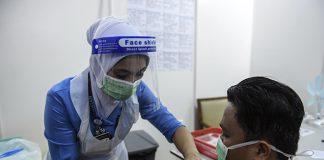KUALA LUMPUR, Nov 11 – It will be a new-normal celebration of Deepavali in Malaysia this year, but the joy of ushering in the Festival of Lights on Nov 14 will not in any way fall short of the triumph of good over evil it signifies.
For some Hindus, Deepavali, or Diwali as the festival is also called, symbolises the homecoming of Lord Rama after rescuing his abducted wife Queen Sita and vanquishing the demon king Ravana.
For other Hindus, it represents the victory of Lord Krishna and his wife Satyabhama over the evil Narakasura.
The triumph of good over evil goes beyond physical conquest; it also encompasses victory over darkness, immorality, ignorance, corruption and disease, to name a few.
One fine example is the triumph of Malaysia’s healthcare personnel in their war against the deadly COVID-19.
Their ongoing success is no small feat.
Since the beginning of this year up to Nov 9, healthcare personnel have nursed back to health 29,579 COVID-19 patients in the country.
That’s 71.8 per cent of the total number of 41,181 people infected by this coronavirus in the country, and higher than the global rate of recovery of 70.5 per cent, as of Nov 9.
Comparatively, according to World Health Organisation (WHO) statistics, the recovery rate is 63 per cent in the United States, the country with the most number of COVID-19 cases – 10,288,480 – as of Nov 9.
Director-General of Health Tan Sri Dr Noor Hisham Abdullah says Malaysia has brought down to less than 1.0 the basic reproductive number R0 (pronounced R Naught), which is indicative of the infectivity rate, that was 2.2 at the beginning of the current third wave of COVID-19.
He attributes the success to the implementation of the Conditional Movement Control Order (CMCO), Enhanced Movement Control Order (EMCO) and Targeted Enhanced Movement Control Order (TEMCO) that have their respective standard operating procedures (SOPs) in place.
He explains the importance of complying with these SOPs, such as:
- avoiding crowded places, confined spaces and close conversation;
- washing hands frequently with soap and water;
- wearing face mask in public places; and
- complying with Health Ministry reminders on exchanging greetings, coughing and sneezing, staying at home, and sanitising surfaces touched often.
Dr Noor Hisham says the absence of a vaccine requires that the battle against COVID-19 be fought outside the human body and, hence, the need for these SOPs.
As such, these and other SOPs will have to be observed during Deepavali as Hindus celebrate the festival in the new normal under the CMCO, EMCO and Recovery Movement Control Order (RMCO).
Senior Minister (Security Cluster) and Defence Minister Datuk Seri Ismail Sabri Yaakob announced on Nov 5 the SOPs that Hindus have to comply with at temples and homes on Deepavali day.
In the RMCO and CMCO zones, at the entrance of temples, they have to record their attendance with the MySejahtera application or in an attendance book, have their body temperature taken and declare themselves free of cough, sore throat and breathing difficulty.
People suffering from chronic ailments, the elderly and children below 12 are discouraged from going to temples in these zones.
Five prayer sessions of 30 minutes each, with 30 people per session, are allowed in temples from 7 am to noon – for five hours or 300 minutes – on Deepavali day. Each session will be separated by a 30-minute period to allow for sanitisation.
Sweet offerings will have to be distributed in packets and the devotees will have to disperse after the prayers.
At homes in the RMCO and CMCO zones, close relatives of up to 20 people are allowed at any one time in landed houses; up to 10 people in strata dwellings of up to 1,500 sq ft and up to 15 people in strata dwellings of up to 2,500 sq ft.
Family members/individuals are encouraged to wear face mask, ensure physical distancing of at least one metre and use hand sanitiser or wash hands frequently with soap and water.
Online sales/business activities are encouraged in these zones. Sales/business activities at premises are allowed only with permission granted by the local authority or other authorities.
In EMCO zones, prayers are not allowed to be conducted in temples and house visits are also disallowed.
At homes in these zones, the celebration must be restricted to family members of the household while ensuring physical distancing and personal hygiene and avoiding crowded areas, confined space and close conversation.
There has to be regular sanitisation especially of the dining tables and surfaces frequently touched.
No sales/business activities are allowed in the EMCO zones.
Celebrating Deepavali in the new normal is one way to break the chain of COVID-19 infection and flatten the curve.
Like Dr Noor Hisham says, let’s take care of ourselves, our families, our community and our nation. We can surely triumph over the evil coronavirus.



















